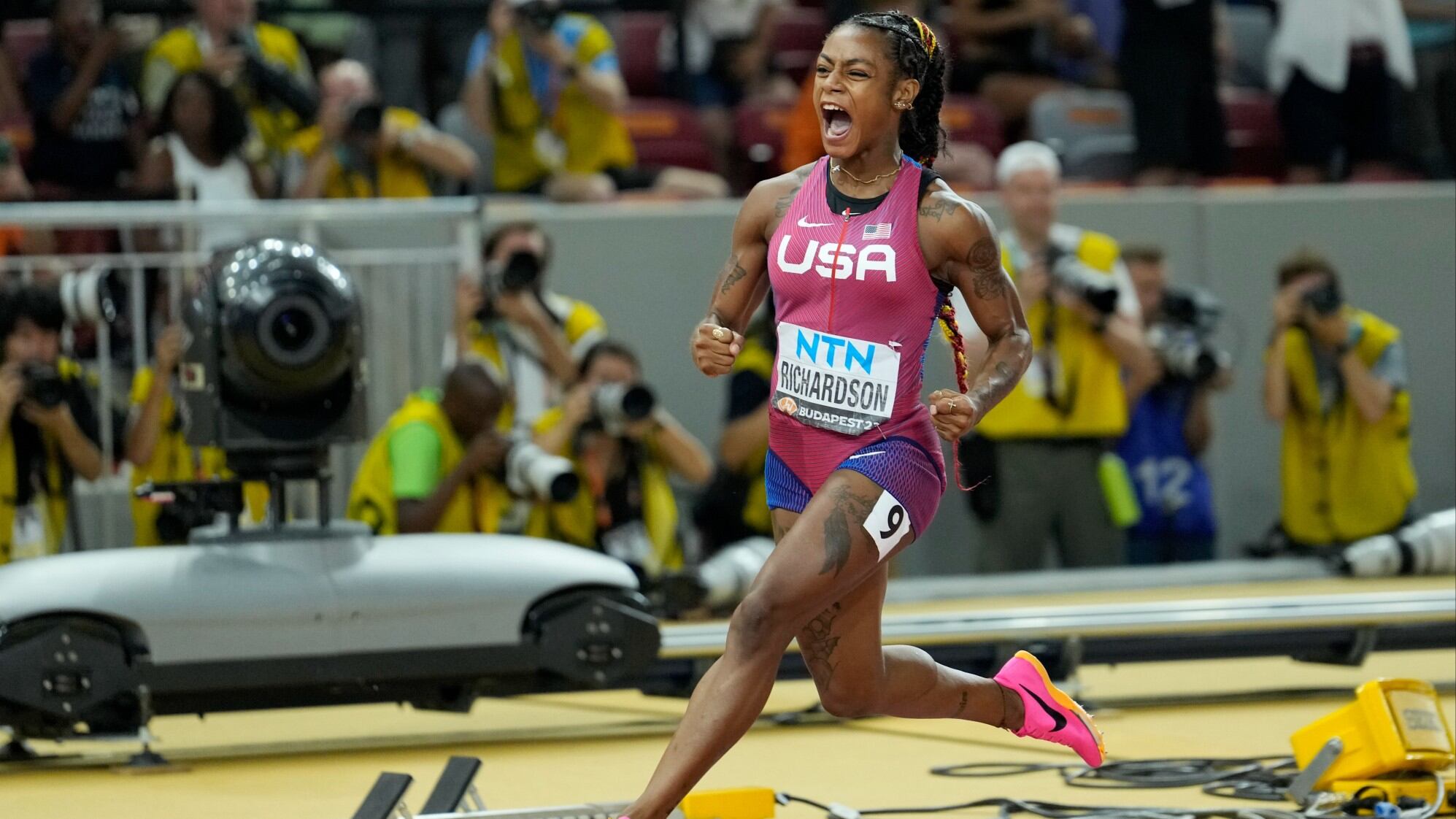By Eddie Pells
Track, and fame, can be brutal games. Nobody felt that more over the past two years than American sprinter Sha'Carri Richardson.
On a sultry Monday night a half-world away from where her problems began, the 23-year-old earned a gold medal at world championships in the biggest 100-meter race this side of the Olympics.
Her victory, in 10.65 seconds over Jamaicans Shericka Jackson and five-time world champion Shelly-Ann Fraser-Pryce, capped a comeback two years in the making and made good on the mantra she's been reciting all year — and repeated yet again after her latest victory: “I'm not back. I'm better.”
Two summers ago after Olympic trials in Eugene, Oregon, Richardson's road to the Tokyo Games was roadblocked by a positive test for marijuana. Her name turned into a litmus test in a wide-ranging debate about race, fairness, the often-impenetrable anti-doping rulebook and, ultimately, about the sometimes razor-thin line between right and wrong.
Richardson said she soaked it all in, surrounded herself with supporters, tried to drown out the rest.
“I would say ‘never give up,’” she said when asked what message this victory sent. “Never allow media, never allow outsiders, never allow anything but yourself and your faith define who you are. I would say 'Always fight. No matter what, fight.'"
For this victory, in a field featuring four of the eight fastest sprinters in history, she fought.
She fought when the vagaries of the track rulebook placed her in the so-called “Semifinal of Death,” paired against Jackson and Marie-Josée Ta Lou, who came in ranked fifth and eighth all-time, in a race where only the top two finishers were guaranteed spots in the final.
In that semifinal, Richardson got off to a wretched start and had to rally from seventh to finish third in 10.84. Her time was the fastest among all non-qualifiers, so she made it to the final.
A mere 70 minutes later, she was lining up on the edge of the track in Lane 9 for the gold-medal sprint, as tough a spot as there is because there’s no way to feel how the top contenders — or anyone, really — is doing.
It made no difference. Even though she had the third-slowest start in the field, nobody got too far ahead. In the end, it was a race between her and Jackson. Jackson crossed and, unable to track what Richardson was doing so far on the outside, looked up to the scoreboard as though she might have won.
But Richardson beat her by .07 seconds, Fraser-Pryce by .12 and Ta Lou by .16. The 10.65 was a world-championships record — Florence Griffith-Joyner's 35-year-old world record of 10.49 still stands — and matched Jackson for the best time in the world this year.
Though Richardson came in 2-0 against Jackson in head-to-head matchups this year, she was still a 5-1 underdog in the race — in part because she was a rookie at worlds going against a field that had amassed 38 Olympic and world-championship medals between them.
The new champion looked stunned after she crossed the finish line. She blew a kiss toward the sky, cast her eyes on that beautiful scoreboard and walked toward the stands in a daze to accept the American flag and congratulations from Fraser-Pryce, Dina Asher-Smith of Britain and others.
“All the heavy hitters were going to bring their ‘A’ game, so it helped me pull out my best ‘A’ game, as well,” Richardson said. “I'm next to living legends. It feels remarkable.”
Richardson appeared ready to become America’s next sprint star when, with her orange hair flowing behind her, she cruised to a win at trials two years ago. But that victory quickly came off the books after she tested positive for marijuana — a doping violation she readily admitted, saying she was in a bad place after the recent death of her mom.
A raucous debate — a lot of it hashed out on social media — ensued over whether marijuana, not a performance enhancer, really belonged on the banned list (it’s still there), but also whether regulators were too keen to go after a young, outspoken, Black, American woman (they said everyone is subject to the same rules).
Richardson spiraled downward for a while, both off the track and on. She finished ninth in her much-hyped return from suspension at the Prefontaine Classic in 2021. Last year, she didn't make the world championship team.
“A year ago, she was in no-man's land, as far as not making the team,” said her agent, former hurdler Renaldo Nehemiah. “And then, to come back and finally find her happy place, which is on the track, and to not try to compete with any kind of negative influences out there. I personally told her, ‘You’ll never win that battle on your best day.'”
Late last summer, Richardson bared her soul in a live chat on social media, urging people to find their true selves, much the way she had done.
With that message sent, she went about fixing things on the track.
But when asked after her biggest victory what, exactly, she fixed, either on the track or off, she didn't speak about technique, speed or tactics.
“You bring who you are onto the track. You bring your athlete into your life,” she said. “Just knowing that people know me not just as an athlete, but as a person. There is no separate, honestly.
"So I'm glad I can display who I really am. Not my pain. Not my sadness. I'm happy I can sit here and be happy with home, and just knowing that it all paid off."













